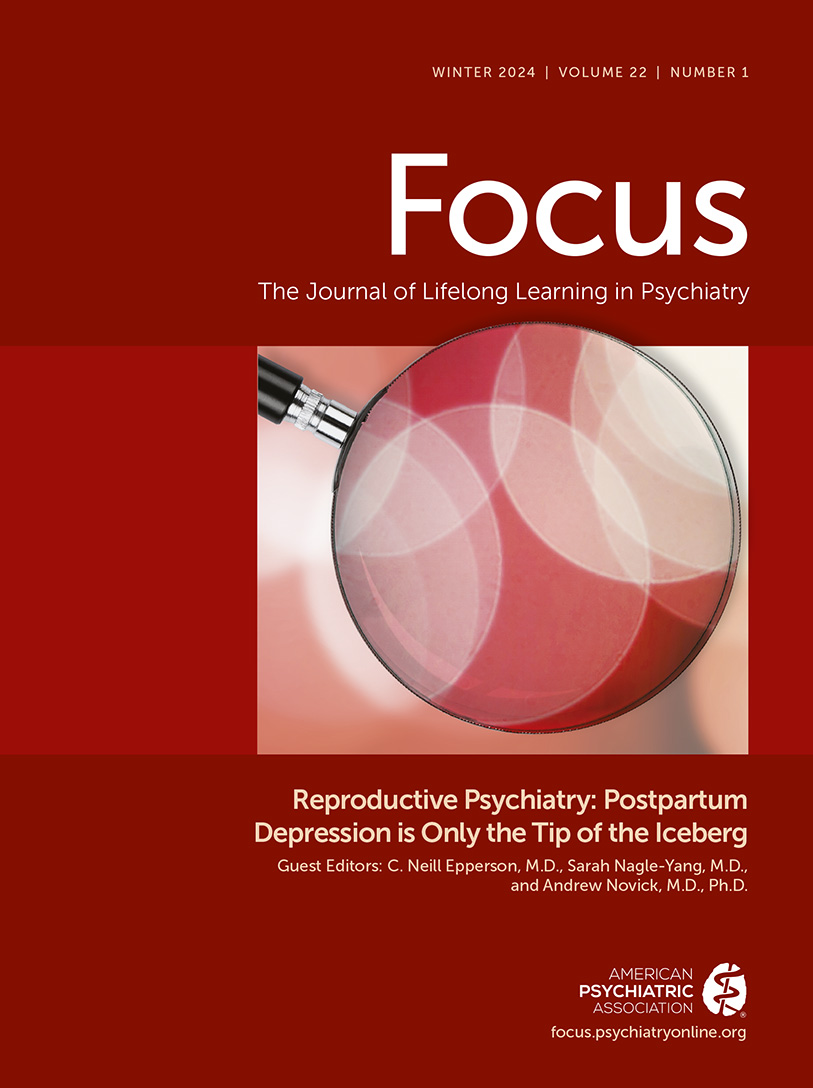Focus
- Volume 15
- Number 3
- July 2017
From the Guest Editor
Reviews
Publication date: 01 July 2017
Pages244–248Primary care clinics are increasingly implementing collaborative care models to care for patients with psychiatric illnesses in primary care. The evidence base for the effectiveness of collaborative care has largely been derived from the care of patients ...
https://doi.org/10.1176/appi.focus.20170005Publication date: 01 July 2017
Pages249–256Traditional models of health care delivery are inadequate for addressing all the needs of the child and adolescent population that has mental illness. The integrated care model seeks to partner pediatric mental health specialists with primary providers to ...
https://doi.org/10.1176/appi.focus.20170013Publication date: 01 July 2017
Pages257–263The objective of this article is to inform psychiatrists and other mental health professionals and primary care providers about the role of telepsychiatry in facilitating integrated care models, particularly in remote primary care practices. A narrative ...
https://doi.org/10.1176/appi.focus.20170007Publication date: 01 July 2017
Pages264–270The functional and financial effects of untreated psychiatric disorders within primary care have led to the development of novel service delivery models to improve access to high-quality, evidence-based mental health treatments. Cognitive-behavioral ...
https://doi.org/10.1176/appi.focus.20170010Publication date: 01 July 2017
Pages271–278Medical progress has greatly extended the life span of individuals living in the United States, yet certain groups have lagged behind in achieving wellness and longevity. Prominent among these are individuals with serious mental illness. Because of this, ...
https://doi.org/10.1176/appi.focus.20170011Clinical Synthesis
Publication date: 01 July 2017
Pages279–283Depression is one of the leading causes of disability worldwide. It often coexists with other chronic conditions, contributing to poor self-management and subsequent poor health outcomes, increased service utilization and cost of care, and poor quality of ...
https://doi.org/10.1176/appi.focus.20170008Publication date: 01 July 2017
Pages284–291Chronic pain affects up to 20% of the population and costs as much as $635 billion per year in the United States alone. The management of chronic pain is fragmented among medical providers of varying specialties, and evidence-based treatments are often ...
https://doi.org/10.1176/appi.focus.20170014Ask the Expert
21st-Century Psychiatrist
Communication Commentary
Ethics Commentary
Safety Commentary
Patient Management Exercise
Bibliography
Abstracts
Influential Publications
Publication date: 01 July 2017
Pages324–332Objective: The spread of evidence-based care is an important challenge in healthcare. We evaluated spread of an evidence-based large-scale multisite collaborative care model for patients with depression and diabetes and/or cardiovascular disease (COMPASS). ...
https://doi.org/10.1176/appi.focus.150304Publication date: 01 July 2017
Pages333–346Background: Studies evaluating collaborative care for anxiety disorders are recently emerging. A systematic review and meta-analysis to estimate the effect of collaborative care for adult patients with anxiety disorders in primary care is therefore ...
https://doi.org/10.1176/appi.focus.15303Publication date: 01 July 2017
Pages347–353There are multiple barriers to accessing high quality, evidence-based behavioral health care for children and adolescents, including stigma, family beliefs, and the signficant paucity of child and adolescent psychiatrists. Although equal access continues ...
https://doi.org/10.1176/appi.focus.150302Publication date: 01 July 2017
Pages361–372Objective: Practice-based collaborative care is a complex evidence-based practice that is difficult to implement in smaller primary care practices that lack on-site mental health staff. Telemedicine-based collaborative care virtually co-locates and ...
https://doi.org/10.1176/appi.focus.15306Past Issues
View Issues Archive
Vol. 22 | No. 4

Vol. 22 | No. 3

Vol. 22 | No. 2
